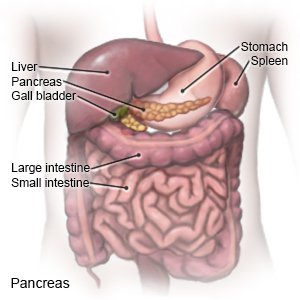Type 2 Diabetes in Adults: New Diagnosis
Medically reviewed by Drugs.com. Last updated on May 6, 2024.
Type 2 diabetes is a disease that affects how your body uses glucose (sugar). Normally, when the blood sugar level increases, the pancreas makes more insulin. Insulin helps move sugar out of the blood so it can be used for energy. Type 2 diabetes develops because either the body cannot make enough insulin, or it cannot use the insulin correctly. Type 2 diabetes can be controlled to prevent damage to your heart, blood vessels, and other organs.
 |
WHILE YOU ARE HERE:
Informed consent
is a legal document that explains the tests, treatments, or procedures that you may need. Informed consent means you understand what will be done and can make decisions about what you want. You give your permission when you sign the consent form. You can have someone sign this form for you if you are not able to sign it. You have the right to understand your medical care in words you know. Before you sign the consent form, understand the risks and benefits of what will be done. Make sure all your questions are answered.
A dietitian
will work with you to create a meal plan that will help you control your blood sugar. Ask your care team provider for more information about meal planning.
An IV
is a small tube placed in your vein that is used to give you medicine or liquids.
Medicines:
Diabetes medicine or insulin may be given to decrease the amount of sugar in your blood. These medicines help your body move the sugar to your cells where it is used for energy. You may also need medicine to lower your risk for heart disease. An example includes medicine to lower or control your cholesterol.
Tests:
- An A1c test shows the average amount of sugar in your blood over the past 2 to 3 months. Your diabetes care team provider will tell you the A1c level that is right for you.
- A fasting plasma glucose test is when your blood sugar level is tested after you have not eaten for 8 hours.
- A 2-hour plasma glucose test starts with a blood sugar level check after you have not eaten for 8 hours. You are then given a glucose drink. Your blood sugar level is checked after 2 hours.
- A random glucose test may be done any time of day, no matter how long ago you ate.
Treatment options
The following list of medications are related to or used in the treatment of this condition.
Diabetes education:
Your diabetes care team will teach you how to manage diabetes. A care team provider may also visit you at home to teach you more about diabetes, or you may attend classes. You will learn what to do if your blood sugar level goes too high or too low. You will also learn how to plan sick day management.
RISKS:
Diabetes that is not controlled can damage your nerves, veins, organs, and arteries. Artery damage may increase your risk for heart attack and stroke. Nerve damage may also lead to other heart, stomach, and nerve problems. Diabetes is life-threatening if it is not controlled. Control your blood glucose levels to prevent health problems. You may need weight loss surgery to help improve or slow the effects of complications.
CARE AGREEMENT:
You have the right to help plan your care. Learn about your health condition and how it may be treated. Discuss treatment options with your healthcare providers to decide what care you want to receive. You always have the right to refuse treatment.© Copyright Merative 2024 Information is for End User's use only and may not be sold, redistributed or otherwise used for commercial purposes.
The above information is an educational aid only. It is not intended as medical advice for individual conditions or treatments. Talk to your doctor, nurse or pharmacist before following any medical regimen to see if it is safe and effective for you.
Learn more about Type 2 Diabetes: New Diagnosis
- Diabetes Medications and Alcohol Interactions
- FDA-Approved Weight Loss Drugs: Can They Help You?
- OneTouch Blood Glucose Meters
- Top 10 Diabetes Treatments You May Have Missed
- What is Insulin Resistance?
- Which Drugs Cause Weight Gain?
Treatment options
Care guides
- Diabetes and your Skin
- Diabetic Hyperglycemia
- How to Draw Up Insulin
- Type 2 Diabetes in Adults: New Diagnosis
- Type 2 Diabetes in Children
Medicine.com guides (external)
Further information
Always consult your healthcare provider to ensure the information displayed on this page applies to your personal circumstances.
